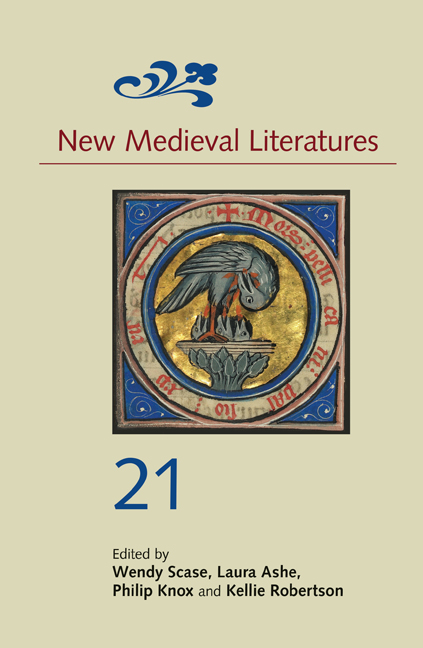Book contents
- Frontmatter
- Contents
- List of Illustrations
- List of Abbreviations
- 1 ‘Chevaliers estre deüsiez’: Genealogy and Historical Sense in Chrétien de Troyes’s Conte du Graal
- 2 English Vernacular Script in the Thirteenth Century (c.1175–c.1325)
- 3 The Manuscript as Agent: The Politics of London, British Library, Additional MS 15268 (Histoire ancienne jusqu’à César)
- 4 Repetition, Craft-Knowledge, and Richard Rolle’s Creaturely Sublime
- 5 Truth-Telling and Truthiness in the Middle English Popular Romances
- 6 Assaying the Deer Drive in Sir Gawain and the Green Knight
- 7 The Past of the Past: Historical Distance and the Medieval Image
5 - Truth-Telling and Truthiness in the Middle English Popular Romances
Published online by Cambridge University Press: 13 April 2021
- Frontmatter
- Contents
- List of Illustrations
- List of Abbreviations
- 1 ‘Chevaliers estre deüsiez’: Genealogy and Historical Sense in Chrétien de Troyes’s Conte du Graal
- 2 English Vernacular Script in the Thirteenth Century (c.1175–c.1325)
- 3 The Manuscript as Agent: The Politics of London, British Library, Additional MS 15268 (Histoire ancienne jusqu’à César)
- 4 Repetition, Craft-Knowledge, and Richard Rolle’s Creaturely Sublime
- 5 Truth-Telling and Truthiness in the Middle English Popular Romances
- 6 Assaying the Deer Drive in Sir Gawain and the Green Knight
- 7 The Past of the Past: Historical Distance and the Medieval Image
Summary
The Middle English popular romances are demonstrably fictional texts. Literary and conventional, they are repetitive and sensationalistic: realism is not often associated with the genre's superlative knights, fairy women, or monstrous creatures. Yet the writers of the Middle English popular romances persistently refer to truth, through what I call truth-claiming conventions. These conventions take a variety of forms in the romances: there are truth-claiming phrases spoken either by the narrator or in direct speech (such as trewely to telle in tale, forsothe to say), the frequent use of emphatic words (certayn, ywis) and, more obliquely, there are references to sources and preceding texts (in geste as y you saye, as I find in me sawe), which claim fidelity and therefore a level of honesty on behalf of this version of the story being told. These stock phrases will all be familiar to readers of even a handful of popular romances; when acknowledged in romance criticism, they are usually considered to be a feature of the genre's overwhelming conventionality. This may be because truth, however central to the romances, is not their purpose: the fundamental motivation of these texts is entertainment, or solaas, to use Chaucer's oft-quoted term. Truth-telling, when it happens, is a by-product of the romance, with texts self-consciously presenting themselves as constructed tale, geste, or romaunce. The functions and consequences of the truth-claims of romance will be the subject of the present article, which seeks to interrogate an overlooked feature of this capacious genre: its truthiness. Defined by the OED as ‘the quality of appearing to be true while not actually or necessarily being so; the fact or quality of accepting or presenting something which is not true as the truth’, truthiness captures a particular quality of romance: the curious need to reconcile its fantastical content with prescriptive and instructive pronouncements on value in contemporary medieval society. I begin by considering the prevalence of and reasons for the truth-claims of romance, moving on to examine their various forms and effects. I then elucidate their purposes and significances through a series of close readings in Lybeaus Desconus, The Erle of Tolous, and Amis and Amiloun. By paying attention to truth-claiming lines in these texts, I reveal both their utility and their potential artistry.
- Type
- Chapter
- Information
- New Medieval Literatures 21 , pp. 144 - 171Publisher: Boydell & BrewerPrint publication year: 2021



